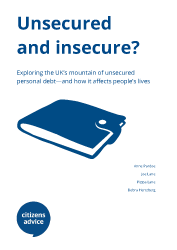Unsecured and insecure? Exploring the UK’s mountain of unsecured personal debt - and how it affects people’s lives
For the last seven years, public policy debate in the UK has been defined by debt. In the main this has been a conversation about government debt and, lately, secured borrowing and the likely impact of an interest rate rise. But what about unsecured debt and the loans, credit cards and overdue bills that define most people’s day to day experience of borrowing and owing money?

How much do UK households owe and who is it owed to? What effect does this have on our lives, attitudes, behaviours and relationships? And is enough being done, effectively enough, to help people avoid money troubles and to find a way out when problems develop?
Unsecured and insecure? 3.54 MB launches a landmark new project to explore unsecured borrowing in the UK. As the country’s biggest multi-channel provider of free debt advice, our advisors help 400,000people find a way forwards with debt problems every year. These conversations show us first-hand and in rich detail how debt and money troubles play out in practice.
We see how profound an effect debt can have on everything from mental health to relationship stability; how inextricably debt issues are linked to wider problems, from housing to employment; and how preventable money problems can be if only the right support is available at the right time.
Citizens Advice helped 400,000 people with debt problems last year. We know that debt problems are often preventable and can easily spiral meaning it is vital that support is available in the right way at the right time. In the coming months we will be exploring the issues highlighted in this report in more detail, reflecting on what this means for the way support is designed and provided.
Explore the report's top findings in our clickable debt map
[Warning: missing iframe content]